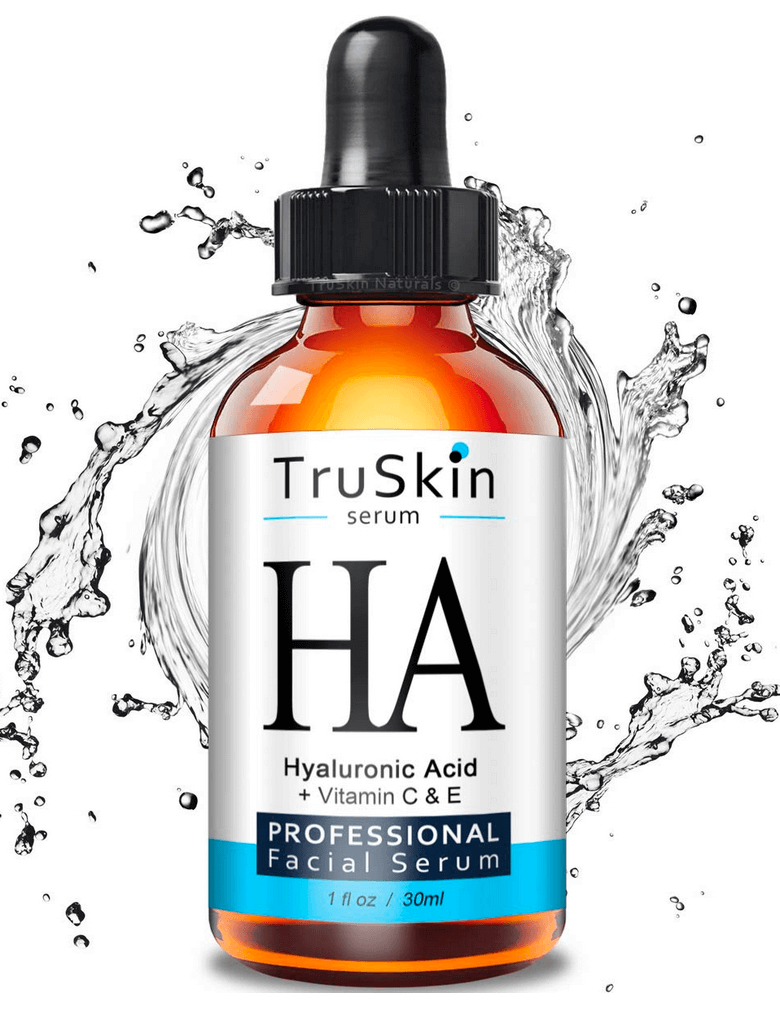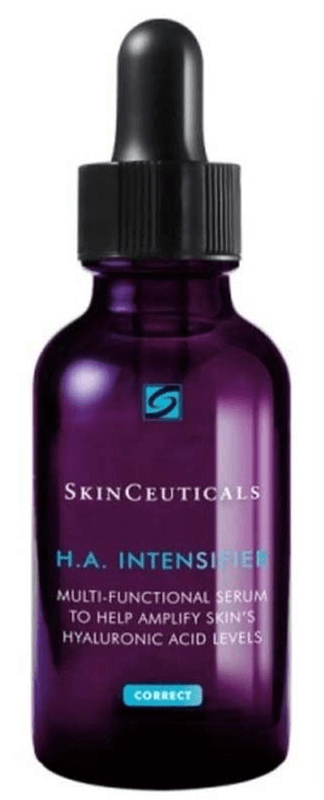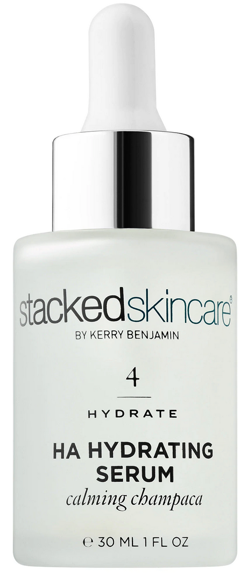Hyaluronic Acid Skin Care Benefits:
All You Need to Know
Hyaluronic acid, also known as sodium hyaluronate, is a golden anti-aging ingredient. A longtime staple through out the skin care industry, hyaluronic acid is naturally occurring in the skin and topical application reinforces its natural benefits. Hyaluronic acid is a humectant, meaning it pulls moisture to itself. Hyaluronic acid is used is many anti-aging products to hydrate dry skin, prevent fine lines and wrinkles, and combat dark circles.
Hyaluronic Acid
INGREDIENT CATEGORY: Humectant
BEST FOR TREATING: Anti-Aging, Dryness, Dark Circles, Fine Lines and Wrinkles
SKIN TYPES FOR USE: All
SAFETY: Hyaluronic acid is safe for topical use in concentrations of up to 2% in skin care products
GHS TIP: It can take up to 6 weeks of consistent topical use of hyaluronic acid before you begin to see improvements
Top 6 Hyaluronic Acid Skin Care Benefits
✓ Occurs Naturally in your Skin
GOLDEN ANTI-AGING INGREDIENT
Hyaluronic acid is naturally produced by your body as a lubricating cushion in the joints and skin. What blows is when we age, our skin produces less hyaluronic acid which means less plump skin and more dryness, fine lines, wrinkles and sagging. To avoid the wrinkle party, supplement your naturally occurring hyaluronic acid with hyaluronic acid products.
✓ Strengthens Skin’s Protective Barrier
PREVENTS FINE LINES & WRINKLES, DRYNESS, AND DARK CIRCLES
Hyaluronic acid is a glycosaminoglycan (or GAG - yes, it’s really abbreviated as GAG) - which means that it’s an essential youth-supporting component to the tissue in your skin. Glycosaminoglycans like hyaluronic acid work to give your skin a youthful appearance (bouncy, supple, and wrinkle-free) by making sure the outer layers of your skin are hydrated, the necessary nutrients are distributed through, and the collagen and elastin in your skin are stabilized.
✓ Reduces Fine Lines and Wrinkles
ANTI-AGING. YES PLEASE.
Hyaluronic acid lessens the appearance of fine lines and wrinkles because it’s such a damn good hydrator. Good hydration plumps your skin, smoothing out existing fine lines and wrinkles.
✓ Hydrates and Plumps your Skin
PREVENTS DRYNESS, FINE LINES & WRINKLES, AND DARK CIRCLES
Hyaluronic acid has incredible water binding capabilities - one gram of hyaluronic acid can hold up to 6 liters of water. Hyaluronic acid hydrates from the outside in by drawing moisture from the humidity in the air to bind with your skin. In addition, hyaluronic acid “plumps” your skin, making it look radiant and youthful by decreasing “epidermis water loss” associated with age, sun exposure, winter dryness or flakiness.
✓ Hydrates without Clogging Pores
GREAT FOR MOISTURIZING OILY OR ACNE-PRONE SKIN
Yes, we want to hydrate, but not at the cost of clogged pores. Hyaluronic acid is non-comedogenic - meaning it hydrates without clogging your pores, making it a great moisturizer for oily and acne prone skin. FYI: If you have oily skin, that does NOT mean it’s hydrated. In fact, skin can overcompensate and produce extra oil when it’s dehydrated, so hydration is key for all skin types, even for oily and acne prone babes.
✓ Antioxidant Properties
ANTI-AGING. YES PLEASE.
Hyaluronic acid provides extra support for the collagen and elastin in your skin that are often damaged by UV rays and environmental stressors.
When to Use Hyaluronic Acid
SKIN CARE ROUTINE OPTION A:
A moisturizer with hyaluronic acid - use 2x a day
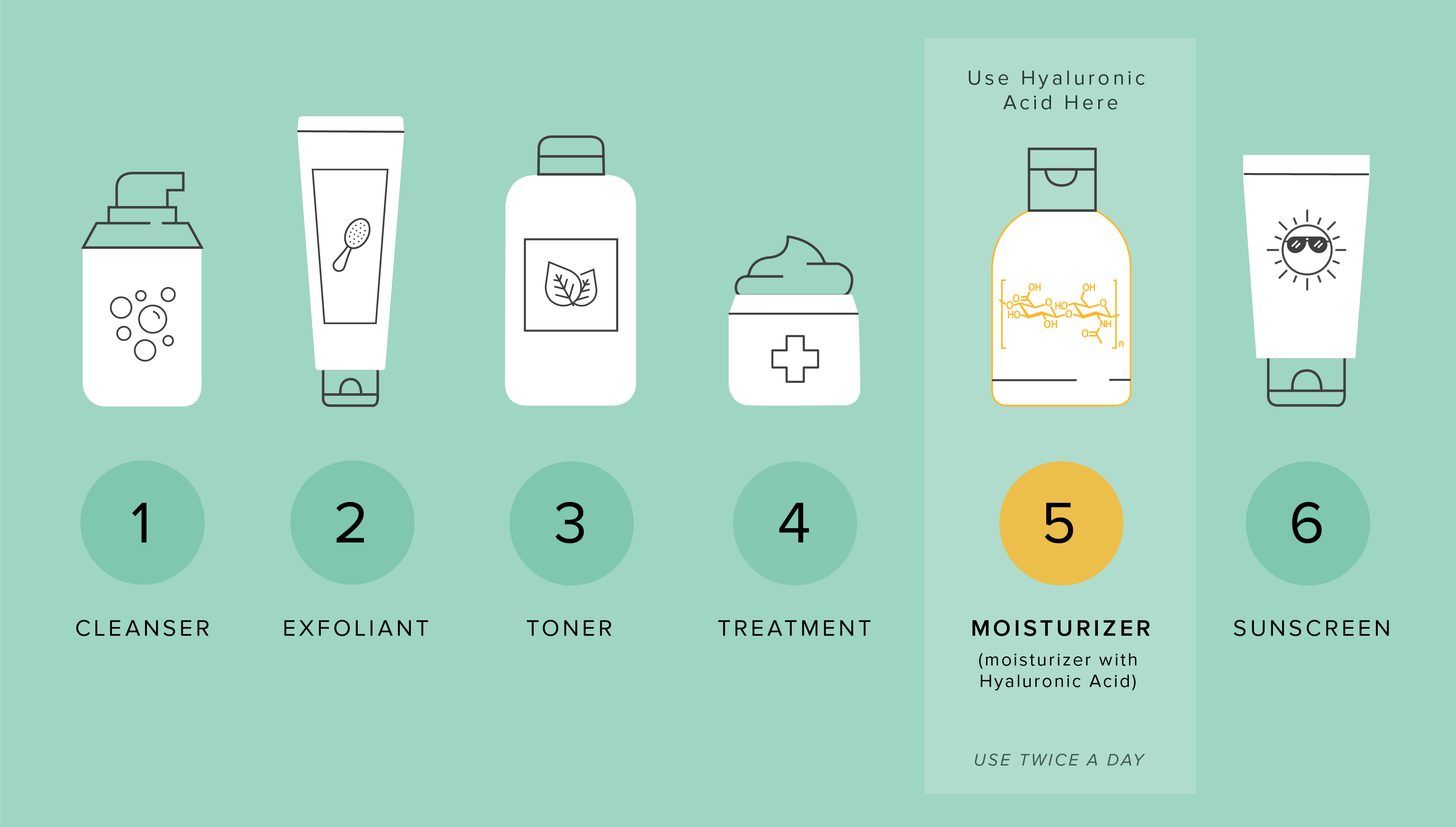
SKIN CARE ROUTINE OPTION B:
A serum, cream, or gel with hyaluronic acid - use 2x a day
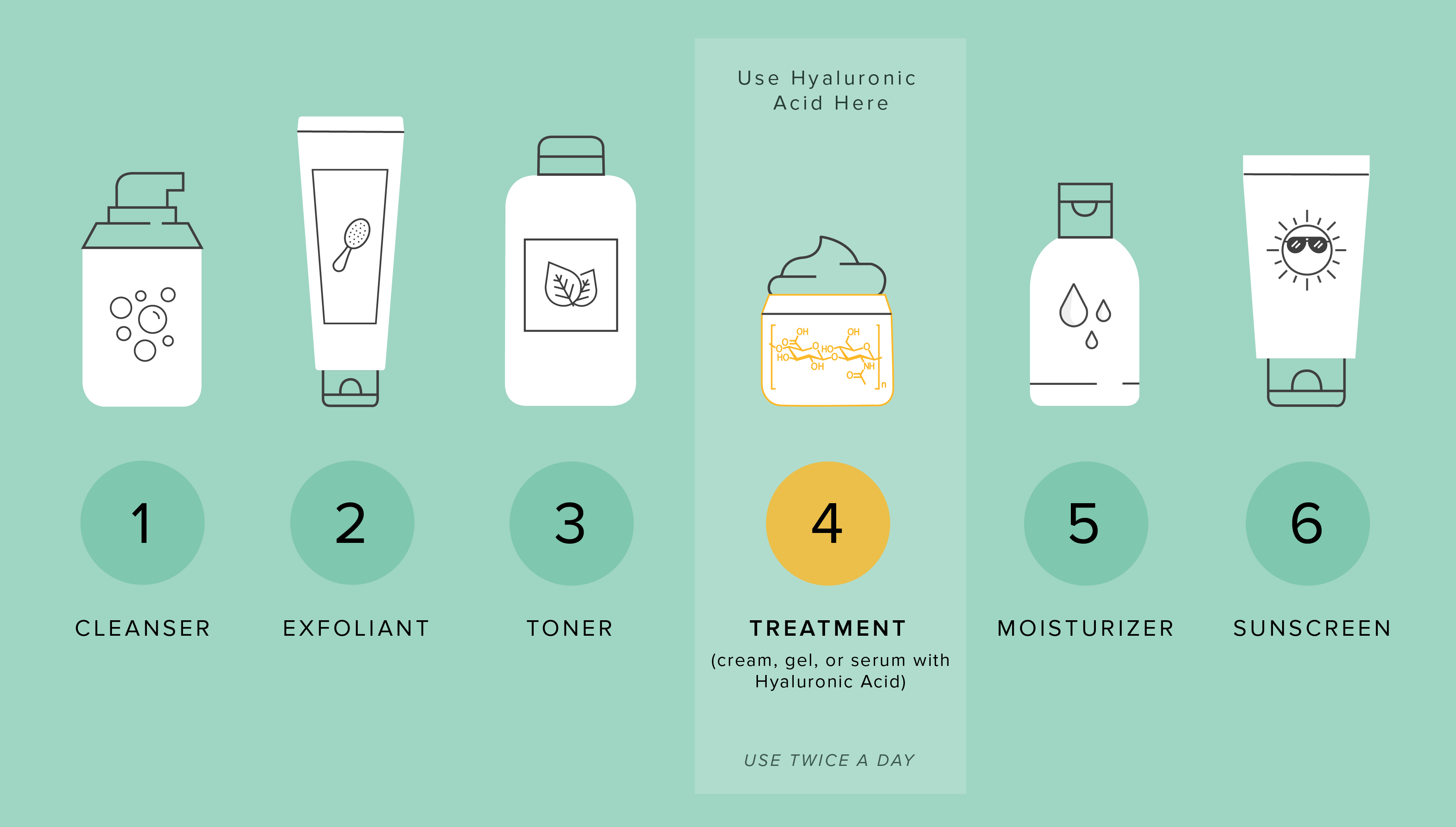
How to Apply Hyaluronic Acid
Apply to entire face
Apply the hyaluronic acid-containing cream, gel, serum, or moisturizer to your entire face in the morning and the evening. Keep that pretty face hydrated. Applying twice a day is essential to keeping your skin fully hydrated.

Follow Up With...
Hyaluronic acid has literally nothing to do with fighting or protecting from UV damage, so be sure to apply sunscreen daily after moisturizing.
Hyaluronic Acid in Products


Anti-Aging
Dark Circles
Dryness
Fine Lines and Wrinkles


All Skin Types!


Creams/Gels
Eye Creams
Masks
Moisturizers
Serums


Over the Counter
Injectable Fillers
Top 3 Hyaluronic Acid Skin Care Products
We’ve put together a GHS curated selection of our favorite skin care products that contain hyaluronic acid (also known as sodium hyaluronate) for hydration, anti-aging, and minimizing fine lines and wrinkles and dark circles. We only link to products that we absolutely believe in. All the products we’ve chosen are paraben-free, sulfate-free, and phthalate-free. Remember - results won’t happen overnight. It can take up to 6 weeks of consistent topical use before you begin to see improvements, so stay consistent with your product usage.
Use in AM & PM
Apply this serum to your face post cleansing, exfoliating, toning, and any AHA or vitamin C serum.
Price $
Certified: paraben-free, sulfate-free, phthalate-free, cruelty-free
Use in AM & PM
Apply this serum to your face post cleansing, exfoliating, toning, and any AHA or vitamin C serum.
Price $$$$
Certified: paraben-free, sulfate-free, phthalate-free
Use in AM & PM
Apply this serum to your face post cleansing, exfoliating, toning, and any AHA or vitamin C serum.
Price $$$$
Certified: paraben-free, sulfate-free, phthalate-free, cruelty-free, vegan, gluten-free
GHS Tips
Consistency is key
Results won’t happen overnight. Consistency is key. It can take up to 6 weeks of consistent topical use before you begin to see improvements. Be patient - good things come to those who wait.

Safety Tips
Hyaluronic acid is FDA Approved for topical use and as injectable fillers. Hyaluronic acid is safe for topical use in concentrations of up to 2% in skin care products.
SIDE EFFECTS: allergic reactions or irritation from hyaluronic acid is rare since it’s something the body naturally produces; however, some people may experience mild redness, swelling, or bruising after a hyaluronic acid filler or injection
✓ Pair with occlusives when using hyaluronic acid in dry climates
Occlusives (i.e shea butter, cocoa butter, or essential oils high in oleic acid) prevent your skin from losing moisture by forming a protective barrier on the surface of your skin, sealing in the moisture.
• Don't use hyaluronic acid without occlusives in dry climates
Without humidity in the air, hyaluronic acid will dehydrate your skin by pulling moisture up from the dermis (deeper layer of your skin) into the epidermis (surface layer of your skin) instead of drawing water molecules from the air.
FAQs about Hyaluronic Acid
Q. Can hyaluronic acid be absorbed through the skin when applied topically?
Yes. Chemists have successfully created tiny hyaluronic acid molecules that can sink below the surface of your skin. We care because the teeny hyaluronic acid molecules seep through your skin’s surface, and draw heavenly hydration to deeper layers your skin (always think of hyaluronic acid as something that pulls moisture to itself). In the past, the hyaluronic acid molecules in skin care products had been too large to be absorbed by your skin. As a result, the large hyaluronic acid molecules would sit on the surface of your skin and draw moisture to your skin’s exterior, but the moisture wouldn’t penetrate beneath the surface into the deeper layers of your skin.
 Q. My skin care product says it’s made up of up to 90% of hyaluronic acid, is that true?
Q. My skin care product says it’s made up of up to 90% of hyaluronic acid, is that true?No. The industry standard for hyaluronic acid in skin care products is 1%-2%. Anything higher than 2% will actually dry out your skin instead of hydrating it (How? Because the higher hyaluronic acid concentration will pull moisture from deeper skin to itself and dry out your deeper layers). If your skin care product was actually 90% hyaluronic acid, it would literally be a salt rock. These shady product descriptions are really saying that 90% of the product solution is mostly water. M-I-S-L-E-A-D-I-N-G.
 Q. Will hyaluronic acid clog my pores?
Q. Will hyaluronic acid clog my pores?No. Hyaluronic acid is non-comedogenic, and therefore it can hydrate your face without clogging your pores.
 Q. Can hyaluronic acid be used with retinol?
Q. Can hyaluronic acid be used with retinol?Yes. In fact, when applied topically with retinol, hyaluronic acid helps minimize the irritation retinol can cause on your skin.
 Q. Is hyaluronic acid similar to salicylic acid or glycolic acid?
Q. Is hyaluronic acid similar to salicylic acid or glycolic acid?No. They all have “acid” in the name, but hyaluronic acid is completely different from salicylic and glycolic acid. Hyaluronic acid is a humectant (something that attracts and holds moisture), and salicylic acid and glycolic acid are chemical exfoliators that remove dead skin cells.
 Q. What is the difference between a humectant and an emollient?
Q. What is the difference between a humectant and an emollient?A humectant, like hyaluronic acid, draws moisture (aka water) from the air and transfers it into your skin. An emollient helps to hold all that moisture in your skin by forming a protective layer over your skin.
 Q. Is hyaluronic acid and sodium hyaluronate the same thing?
Q. Is hyaluronic acid and sodium hyaluronate the same thing?No. However, there is a connection between the two. Sodium hyaluronate is the salt form of hyaluronic acid. Similar to hyaluronic acid, sodium hyaluronate is a badass hydrator (it can hold up to 1000x its weight in water), and historically, it’s better absorbed by the skin than hyaluronic acid because sodium hyaluronate has a smaller molecule size (chemists have since created smaller hyaluronic acid formulas that can absorb into the skin but sodium hyaluronate molecules are still smaller). BUT unlike hyaluronic acid, there are no public studies stating that sodium hyaluronate can also strengthen your skin’s protective barrier and boost collagen levels. Long story short, they are similar but different, and no harm in using both.
 Q. What are hyaluronic acid fillers/injections?
Q. What are hyaluronic acid fillers/injections?Hyaluronic acid fillers/injections are soft tissue fillers that augment and plump wherever they are injected. We recommend using hyaluronic acid products before thinking about injections, but common uses for fillers include:
- Filling out structural dark circles (if you have a depressed or hollow areas under the eyes)
- Reducing fine lines and wrinkles (i.e. crow’s feet, frown lines, smile lines, marionette lines, lip lines)
- Plumping skin depressions from acne, scars, or injuries
- Source of the hyaluronic acid (avian vs. bacteria-sourced)
- Concentration levels of hyaluronic acid
- Molecule size of the hyaluronic acid
- Monophasic hyaluronic acid (cohesive - molecules remain binded) vs. biphasic hyaluronic acid (customizable - molecule size can change to treat a specific area)
- An anesthetic in the hyaluronic acid syringe vs. no anesthetic in the hyaluronic acid syringe
Learn More
 Q. Are hyaluronic acid fillers/injections safe?
Q. Are hyaluronic acid fillers/injections safe? Yes. The procedure is noninvasive and very safe. Learn more about FDA Approved hyaluronic acid fillers.
 Q. Are hyaluronic acid fillers/injections painful?
Q. Are hyaluronic acid fillers/injections painful?You might have some discomfort in the moment, but there's little to no pain following a hyaluronic acid injection/filler.
 Q. How long do hyaluronic acid fillers/injections last?
Q. How long do hyaluronic acid fillers/injections last?Hyaluronic fillers are temporary - they last 6-12 months and are absorbed by your body over time.
 Q. Can hyaluronic acid be used on lips?
Q. Can hyaluronic acid be used on lips?Yes. Hyaluronic acid fillers such as Juvederm and Restylane are commonly used for lip augmentations to give your lips a plumped look. Pouty duck face on fleek (if you’re into that sort of thing).
 Q. Do hyaluronic acid skin care products expire?
Q. Do hyaluronic acid skin care products expire?Yes. Look for the expiration date or a POA (prescribed period after opening) which tells you how long the product is good after it’s been opened. If your hyaluronic acid product has expired, do not use it - expired products can cause skin irritation, bacterial infection, or breakouts.
 Q. What are common names used to identify hyaluronic acid on an ingredient list for skin care products?
Q. What are common names used to identify hyaluronic acid on an ingredient list for skin care products?
- Hyaluronic Acid
- Sodium Hyaluronate
- HA
 Q. What professinal skin care brand filler products contain hyaluronic acid?
Q. What professinal skin care brand filler products contain hyaluronic acid?

Related Pages
How to Treat Dryness - Causes, Treatments, & Top Ingredients
10 Best Hydrating Products for Treating Dry Skin
10 Best Cruelty-Free Products for Treating Dry Skin
How to Treat Fine Lines & Wrinkles - Causes, Treatments, & Top Ingredients
10 Best Products for Preventing Fine Lines & Wrinkles
10 Best Cruelty-Free Products for Preventing Fine Lines & Wrinkles
How to Reduce Dark Circles - Causes, Treatments, & Top Ingredients
10 Best Products for Reducing Dark Circles
10 Best Cruelty-Free Products for Reducing Dark Circles
Want More GHS Tips?
It’ll be the best thing to ever slide into your DM's.
